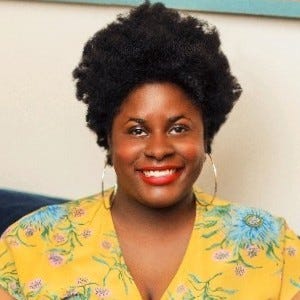In This Edition
🏕️ Working at Summer Camp can be a training ground for management
🎓 Tap into Executive Education to enhance your career path
📝 Prioritizing partnerships with communications
About LaToya
LaToya has a dual masters in Industrial-Organizational Psychology and Organizational Behavior from Brooklyn College. Her professional experience spans from executive coaching to driving organizational changes and culture transformations for technology companies globally.
LaToya’s previous roles include Vice President of Talent Strategy at Oscar Health, Head of Employee Relations and Senior Human Resource Business Partner at Compass, and Head of Global HR at LivePerson. LaToya is also a four-time National DisruptHR presenter, GoCoach, and ThinkHuman recurring contributor. She is also a Harvard University and MIT executive coaching and artificial intelligence professional.
What sparked your path into the field of People?
We are the team that focuses on building products and outcomes for the business to grow and strengthen and develop.
When I was 16 years old, I knew that I wanted to do this job. I didn’t know that the field existed, but I knew that I wanted to connect directly with the employee experience and the employer experience. My first job was at the Delacorte Theater in New York City — it’s well known for producing Shakespeare in the Park. That’s where I was first introduced to the people field professionally.
Fast forward, I worked at a summer camp where I served as a Director at 21 years old and managed 11 direct reports. The owner of the Camp had a Masters in Industrial Organizational Behavior. She would bring in these psychologists to talk about intentional learning and training. I loved this work so much and finally found the language for the type of work I wanted to pursue.
Can you tell us about your educational path and how you keep learning today?
As an undergrad, I studied applied psychology. Then I moved into philosophy and behavior learning — understanding how the brain works and hard psychology science. I earned a dual Masters from Brooklyn College. The leader of the program was a student of Abraham Maslow — a prominent psychologist who created the five hierarchies. This unique degree focused on Industrial Psychology – the philosophy of thoughts and the theories — and Organizational behavior — how your organization behaves. It taught me to see the macro and micro views of the field.
Then, I attended an Executive Program at Harvard where I studied Strategic Coaching for Executives. I followed that with Executive Certification at MIT in Artificial Intelligence and Business Solutions. I wrote a thesis on Natural Learning Processes — how to build a bot to help with everyday HR tasks for employees.
I applied this to work by creating a bot at LivePerson! I used the platform to create a bunch of different common HR questions with answers. We built it as “Ask Amy” – she was actually the HR generalist. Employees could text Amy the Bot. If she couldn’t help you, then she created a ticket and the real Amy would come and answer the questions. We found our ticket tracking went down 47% within month one and we were able to have a major impact.
To keep learning, I recommend creating a group of peers and staying connected with them at least each quarter. I’ve been fortunate to have a great network within People Officers in New York City. Find your network!
What is a project that you are proud of accomplishing in this field?
At LivePerson, I led a transformational project to shift the culture — I spearheaded operationalizing values from two to fourteen. We kicked it off with 40 people who gathered for the planning process.
Then I traveled around the world to make sure it made sense locally to our global offices — I visited 7 countries in 45 days! I returned with this body of work of how different people were interpreting the values and created a mindset for them.
The end result was to get alignment and drive an outcome for the business. In a survey, we found that the folks who connected more with their values at work, their sales productivity went up. We were able to find the data that aligned with what we wanted to achieve and have great results for our company.
In your role at CPO, how do you collaborate with Internal Communications?
I just sent them a message a few minutes ago! Every day, I work with internal comms. I focus on road mapping, development, structure and alignment about what’s going to be communicated and how it’s communicated.
When I arrived at Help Scout, there wasn’t an internal comms team. As part of my top three priorities, I committed to upgrading comms and talent acquisition. Internal comms is a big part of it. I’m so happy to have this role in-house, from change management to all major announcements, they shepherd the way for important information to be shared with our employees.
Fast forward, what do you think the future of communications at work looks like?
It’s going to be fast-paced with sound bites. We’re going to move away from long company-wide emails. Communications is going to be expected across the board in small bites — it’s how we absorb information anyway. We’re going to shift from a memo and move toward rapid-motion communications.
Thank you for reading The Switchboard. ☎️ Every edition is personally curated by me — Julia Levy. Learn more about why I write. Review the Index of past posts.
If you enjoyed this article, consider sharing it, giving a heart below ❤️, commenting or posting on LinkedIn and Twitter.




